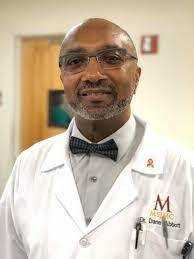January is cervical cancer awareness month, and gynaecologist and obstetrician, Dr. Dane Abbott, is doing his part to share information about the disease.
According to Dr. Abbott, medical statistics gathered here in Antigua and Barbuda have shown that each year since 1984, 7 to 8 women have been diagnosed with cervical cancer. Of this number, 2 or 3 will go on to die.
However, Dr. Abbott says advances in medical technology and science mean that women no longer have to face death as the ultimate consequence of this cancer.
If detected early, cervical cancer has a survival rate of about 95 percent. Late stage detection reduces the chances of survival to about 15 percent.
Armed with this information, Dr. Abbott says it is critically important for women to have regular gynaecological check-ups in order to detect abnormal cervical cell development early. This is because these abnormal cells can take anywhere from 10 to 20 years to develop into cancer. Early detection, therefore, almost guarantees a successful treatment outcome.
He is also raising awareness about the Human Papilloma Virus, HPV, which research suggests is the leading cause of cervical cancer in women.
“Normally, cells on the cervix are supposed to divide and grow and die. In cancer, however, these cells undergo abnormal growth. So they will grow and divide, but some of them don’t die.
“We know that in cervical cancer there is a virus, known as Human Papilloma Virus or HPV, which, once it infects the cells of the cervix, can cause these cells to become abnormal and develop into cancer.
“The good thing about cancer of the cervix, is that it takes a long time to develop. So if a woman gets HPV today, it takes maybe, 10, 15, 20 years for that HVP to cause enough damage to the cervix to then become cancerous.
“There are some tests which can be done to catch HPV early before the woman actually gets cancer and that test is a PAP smear test. It’s a simple test, it’s cheap and it’s very effective in finding changes on the cervix – precancerous changes,” he explained.
PAP smear screenings in women who show no signs of abnormal cells should occur at intervals of three to as many as five years under the advice of a medical doctor who decide what is appropriate for their patient based on the type of screening performed and their results.
Dr. Abbott continued that HPV is itself preventable, as there is a vaccine which is available for young children who are not yet sexually active.
“There is a vaccine available to women, girls and even boys. The recommendation is that when a [child] gets to about 9 to 11 years of age, they can get an HPV vaccine.
“This HVP vaccine has been around since 2006. So there are millions who have had this vaccine and this vaccine is available here in Antigua. So we know it’s safe, we know it’s effective in trying to prevent HPV.”
Most critically, Dr. Abbott is driving home the message that cervical cancer is a preventable disease. Therefore, he strongly believes that the importance of the availability of the HPV vaccine, coupled with regular PAP smear screenings cannot be overstated.
“Now because cancer of the cervix is preventable, those 7 or 8 women who get cancer, and those 2 or 3 women who die, that’s a preventable illness, that’s a preventable death.
“So what we have found, is that countries that have very good PAP smear screening programmes, those countries have brought down the number of women who are getting cancer of the cervix and the number of women dying of cancer of the cervix, very low.
“Here in Antigua we just don’t have enough women going to get regular PAP smears and that is one of the reasons we still see our numbers being high,” Dr. Abbott concluded.


